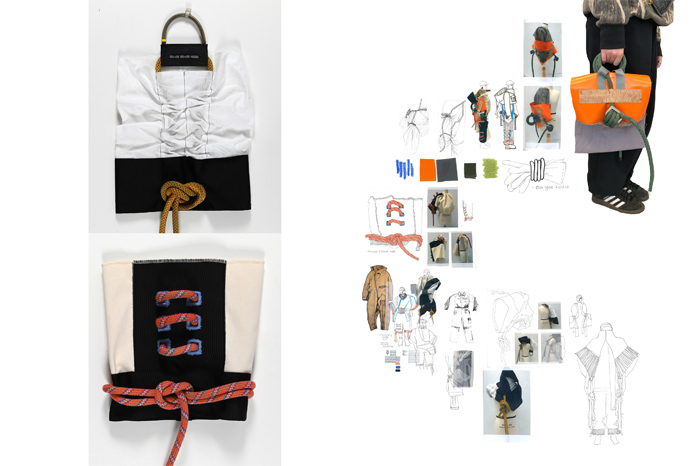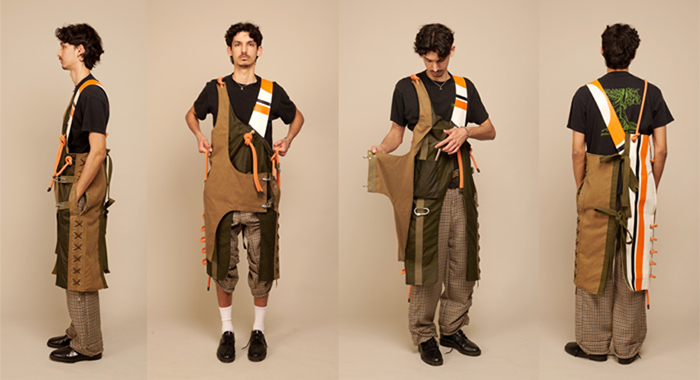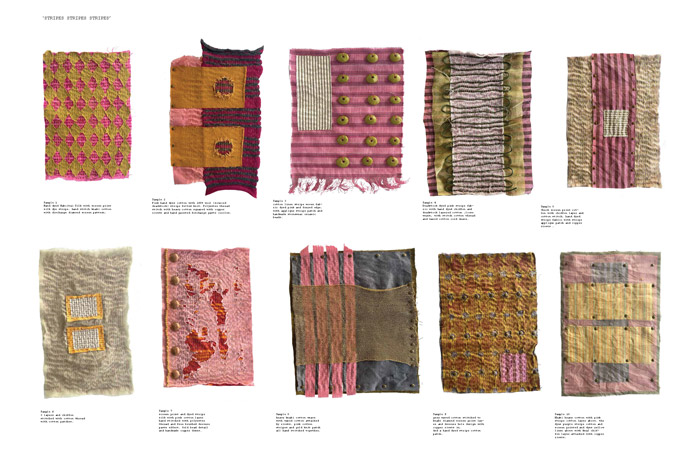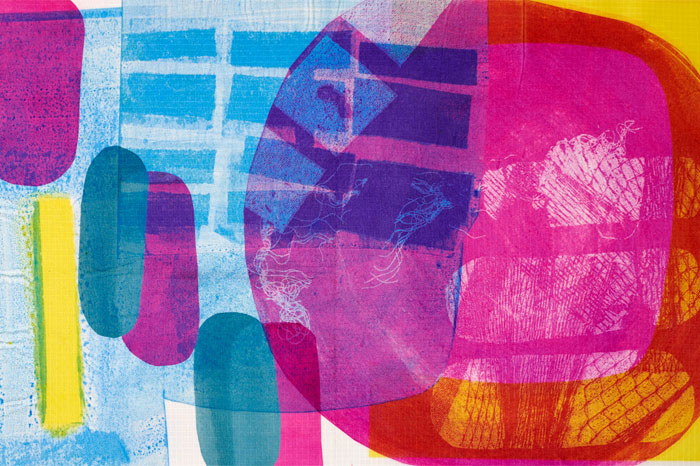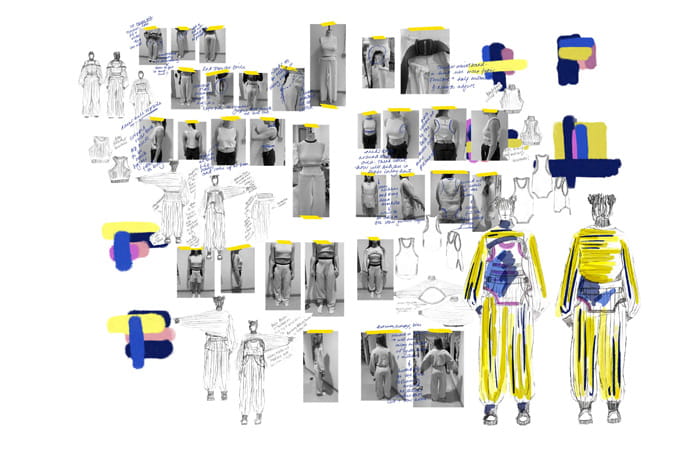
BA(Hons) Fashion Textiles
This course is open for applications
About
Learn to create garments, accessories and textile collections for fashion and interiors through sustainably driven and digitally enabled design.
Why study fashion textiles?
Fashion textiles is the largest of the UK creative industries; designers and creatives in this field are globally recognised for their skills and innovation. Today's fashion and textile designers are agile creatives with the skills to design responsibly and the vision to transform the future of Fashion.
Why UWE Bristol?
BA (Hons) Fashion Textiles is an industry-focused course that develops your creative, technical and professional skills across both fashion and textile design. You'll explore the full spectrum of fashion textiles, and will have the opportunity to specialise into one of three pathways: Fashion Design, Textile Design or Fashion Textile Futures.
You'll develop studio, technical and digital skills in both fashion and textile design, translating 2D ideas into 3D through garment construction, textile print, knit, embroidery, pattern cutting and fashion futures. Alongside core subject skills, you'll also gain transferrable ones like collaboration, communication, and project management.
Work with industry experts on live studio briefs and gain hands-on experience with an optional year in industry or to take part in international exchanges to places like Hong Kong or Berlin.
You'll study at City Campus; our creative powerhouse spanning Bristol, where you'll have access to dedicated studio spaces, specialist workshop facilities, and extensive library resources.
Showcase your work to talent scouts and potential employers at the final year Degree Show. And also at major events like London Fashion Week, Graduate Fashion Week, and The British Fashion Council's Graduate Preview Day.
Which of these courses is right for me?
As well as the BA(Hons), we offer our BA(Hons) Fashion Textiles with an integrated Foundation Year as preparation if you don't yet have the right qualifications to join at Year one.
Where can it take me?
Many of our graduates go on to secure successful careers with high profile designers and companies like Craig Green, Erdem, Matthew Williamson, COS and Victoria Beckham.
Some graduates set up their own businesses or go onto postgraduate study and research.
The course will equip you with the skills and confidence to progress into your preferred future.
Follow UWE Fashion on Instagram.
Take a look at how our graduates Amy and Michalis are changing the future of fashion.
Read how one of our former students won the prestigious Venture Ready Award after setting up her sustainable fashion business, AKN JEANS.
Have a look at some of our students' latest work in our 2022 yearbook, 2023 yearbook, 2024 yearbook and 2025 yearbook.
The image above shows the fantastic work from one of our students (Alice Davis, 2023 Fashion Textiles graduate).
Student showcase
Watch: Welcome to the School of Arts at UWE Bristol
Entry
Typical offers
You will need to meet the following Level 2 requirements:
- GCSE: Grade C/4 in English, or equivalent.
In addition to the above Level 2 qualifications, you'll need to achieve the published tariff points from your Level 3 studies prior to entry. Below is an indicative list of the main qualification types. However, we will consider any Level 3 qualifications towards meeting our entry requirements.
- Tariff points: 112
- Contextual tariff: See our contextual offers page.
- English Language Requirement:
International and EU applicants are required to have a minimum overall IELTS (Academic) score of 6.0 with 5.5 in each component (or approved equivalent*).
*The university accepts a large number of UK and International Qualifications in place of IELTS. You can find details of acceptable tests and the required grades you will need in our English Language section. Please visit our English language requirements page.
- A-level subjects: No specific subjects required.
- EDEXCEL (BTEC) Diploma: No specific subjects required.
For information on required Guided Learning Hours please see our minimum entry requirements page.
- Access: No specific subjects required.
- Baccalaureate IB: No specific subjects required. We accept the IB Career-related Programme in conjunction with other Level 3 qualifications.
- Irish Highers: No specific subjects required.
- Welsh Baccalaureate: We accept tariff points achieved from the Advanced Skills Baccalaureate Wales in conjunction with other Level 3 qualifications.
- Cambridge Technical: No specific subjects required.
- T Levels: No specific subjects required.
Selection process
Following our review of your application, if you're not studying a related subject, we may request that you provide us with a digital portfolio.
If you are asked to provide a digital portfolio, you may also be invited for an online interview, if we have any questions about your portfolio.
A decision will then be made on the basis of both your application and our review of your portfolio.
For more details on the process, please visit our selection page.
Entry requirements
If you don't meet the entry requirements, you may be eligible for BA(Hons) Fashion Textiles (with Foundation Year).
International applicants
If you're applying to UWE Bristol from another country or region, visit the international study pages for tailored application information. If you're an international student and don't meet the academic requirements to study this course, you can qualify by completing one of our Art and Design foundation programmes.
If you're applying to study at UWE Bristol and require additional support to meet our English language requirements, you may be able to attend one of our pre-sessional English courses. Read more about our Pre-Sessional English Programme.
Read more about entry requirements.
How to apply
Read more about undergraduate applications.
Read more about international applications and key international deadline dates.
For further information
- Email:
UK applicants
Admissions@uwe.ac.ukInternational/EU applicants
International@uwe.ac.uk - Telephone:
UK applicants
+44 (0)117 32 83333International/EU applicants
+44 (0)117 32 86644
Structure
Content
Year one
You'll study:
- Design Studio 2 Design Methods
- Design Studio 1 Developing Ideas through Form
- Design Contexts
- Introduction to Fashion Textiles.
Year two
You'll study:
- Design Studio 3 Industry Process
- Design Studio 4 Design Innovation.
Plus
Either
- International Exchange*
Or
- Design Studio 5 Industry Practice**
- Design Futures.**
*Compulsory (and only available to study) if you participate in an International Exchange.
**Not available to study if you participate in an International Exchange.
Placement year (if applicable)
If you study on the four year (sandwich) course, you'll spend a year away from the University on a work placement after year two.
You'll study the Fashion Textiles Professional Development on Placement module.
See the Placements and Fees sections for more information.
Final year
You'll study:
- Graduate Development and Progression
- Design Studio 6 - Part 1 Ideation and Development***
- Design Studio 6 - Part 2 Design and Realisation
- Design Research Project.
***Not available to study if you complete the sandwich placement year.
This structure is for full-time students only. Part-time students study the same modules but the delivery pattern will be different.
The University continually enhances our offer by responding to feedback from our students and other stakeholders, ensuring the curriculum is kept up to date and our graduates are equipped with the knowledge and skills they need for the real world. This may result in changes to the course. If changes to your course are approved, we'll inform you.
"My course offered fantastic facilities, workshops and equipment to help me exercise my creativity and develop as a young designer. I started interning after I graduated, where I had the chance to work at London Fashion Week. I now work as a Junior Designer at Superdry." Emilia, Fashion Textiles graduate
Learning and Teaching
This practice-based course offers learning in design studios and technical resource centres. You'll engage in individual projects and collaborative briefs, with on-campus studio sessions averaging two days a week.Teaching methods include studio teaching, Design tasks, technical workshops, lectures, seminars, and tutorials. You'll produce a range of outcomes, such as 2D Design Work, 3D garments, textile collections, technical sampling, sketchbooks, essays, reports, presentations, and CAD work.After induction into technical workshops, you'll be able to access resources independently and work on set briefs, creative tasks and projects.
You'll explore graduate opportunities, develop enterprise skills, and participate in live projects, industry briefs, competitions, and placements. In the final year, you'll develop a body of work tailored to your creative and professional interests.Guest lecturers and industry experts provide professional input. You'll get to showcase your work at high-profile events like our annual Degree Show, Graduate Fashion Week and London Fashion Week Digital.
See our full glossary of learning and teaching terms.
Study time
In a typical week in your first year, you could expect to be timetabled with academic and technical staff for an average of 12 hours, with the expectation that you'll also work on practice and assessment tasks through independent self-study for an additional 12-18 hours.
Assessment
There are no exams on this course and you'll be assessed through design-based course work, presentations, written assignments and research projects.
Learn more about assessments.
Fees
Full-time, sandwich course
Indicative Additional Costs
Part time course
Supplementary fee information
Your overall entitlement to funding is based on how long the course is that you're registered on. Standard funding is allocated based on the standard number of years that your course lasts, plus one additional year.
You'll apply for funding each year that you study and Student Finance will take into account how long the course is in each year that you apply. So if you register for the four year course and then transfer to the three year course, the number of years you can apply for funding will change. Student Finance will reassess your funding based on how many years you have been in study, not just those years for which you received student finance.
Always seek advice before taking any action that may have implications for your funding.
Additional costs
This refers to items you could need during your studies that aren't covered by the standard tuition fee. These could be materials, textbooks, travel, clothing, software or printing.
Features
Placements
Students who get work experience tend to graduate with better degrees. Experience also hones your skills, industry knowledge and professional network, making you a sought after graduate.
Professional practice is key to this course and you'll have an opportunity to do a work placement at every level to develop your professional skills. You'll also build your network as you progress through the course and learn how to promote and position yourself, and how build a compelling portfolio to take to employers.
If you choose the four year (sandwich) course, you'll spend a year away from the University on a work placement after Year two. Past students have completed Internships with fashion labels such as JW Anderson, Iris Van Herpen, Erdem, Vivienne Westwood and Helen Kirkham.
Get help to find your placement and support throughout from staff within the School and our award-winning careers service.
Study exchange
Broaden your perspective by taking part in our international or European exchange programme, spending a semester at one of our partner universities. Partner universities abroad.
Increase your confidence, intercultural communication skills and boost your employability.
Explore our study abroad pages to find out more.
Fieldwork
Go on regular trips to London and other major cities so you can source new materials and conduct research in galleries, museums and archives.
Visit Trade Shows, Archives and undertake In-Store visits to broaden your knowledge and inspire your creative development.
Study facilities
Learn at our City Campus, with access to some of the best technical and creative resources in the country.
Construct garments in our industry standard sample and sewing room and develop technical skills in knit and digital embroidery. Access printed textiles rooms with facilities for screen print, dyeing, fabric manipulation, embellishment and decoration, plus digital, photo and heat transfer printing.
Experiment with materials, alternative forms and wearables in our physical making studios. Bring 2D ideas to life in our print centre, using the latest equipment for screen printing, etching, digital printing and lithography.
A mix of traditional and hands-on learning environments helps you quickly take on essential knowledge and skills, standing you in good stead for your professional career.
Learn more about UWE Bristol's facilities and resources.
Take a personalised virtual tour of the Fashion facilities and experience what a typical day could look like here for you.
Personalised virtual tour
There's no need to visit us in person to explore our facilities and campuses. Take a personalised virtual tour and discover it all for yourself from wherever you are.
Take a virtual tourCareers
Careers / Further study
Our graduates go on to careers in industry, enterprise or further study, taking on roles such as fashion designer, textile designer, product developer, pattern cutter, studio manager or fashion buyer.
You'll benefit from regular professional input from guest lecturers, past Industry speakers include Christopher Shannon, ASOS, Superdry, Richard Malone and COS.
As well as making sure that the course reflects industry, experts come in to present and deliver live briefs. Recent collaborative partners include Phoebe English, Bethany Williams and Workwear Solutions International.
Showcase your work at some of the UK's highest profile Graduate Events such as Graduate Fashion Week, British Fashion Council Graduate Preview Day and London Fashion Week Digital.
Our degree show showcases our most exciting graduate work in art, design, filmmaking and media. We also encourage you to show work on and off-line throughout the course and will help you develop the skills to do this. See our showcase of student work from the BA(Hons) Fashion Textiles course at UWE Bristol.
Developing professional, research and enterprise skills throughout the course will equip you with the skills and confidence you need to progress into your preferred future. Whatever you choose to do, our team of subject experts and careers service are there to support you.
Get inspired
Our award-winning careers service will develop your employment potential through career coaching and help find you graduate jobs, placements and global opportunities.
We can also help find local volunteering and community opportunities, provide support for entrepreneurial activity and get you access to employer events.
Visit our Graduate destinations pages to learn more about careers, employers and what our students are doing six months after graduating.
Jade Jackson: Student Showcase
Hear from BA(Hons) Fashion Textiles graduate, Jade Jackson, about their Extended Study Project.
Life

Accommodation
An excellent range of options for all of the Bristol campuses and the city centre.

Bristol
A stunning city for student living with all the qualities to make you want to stay.

Sports, societies and activities
There is more to your experience here than study. Choose to make the most of it and try new things.

Health and Wellbeing
We provide support in the way you need it.

Campus and facilities
Discover our campuses and the wealth of facilities provided for our students.
